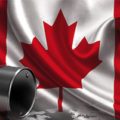It is no secret to anyone that the Canadian economy has been unable to adjust to the shift in oil price. Once the markets realized that the world was flooded with black gold, all the dominos in the Canadian economy started falling slowly, one by one. Alberta was the first to fall, and probably the hardest hit so far. This province which single-handedly sustained the Canadian economy with extraordinary oil revenue for the best part of the last 15 years, is deep into a recession – if not depression – and has not been able to shift away from its oil dependence despite the efforts from its government.
At the national level, the country’s figures have shown what its government is reluctant to accept. Canadians are indebted like never before in history, the housing market in main cities like Vancouver and Toronto looks like it will keep on soaring non-stop, and the manufacturing sector has been unable to pull through even though the conditions are ripe – US economy is growing and the Canadian Dollar is weak. In the meantime, the TSX, the Toronto Stock Exchange main index, keeps on rising. Too much air is being blown into the Canadian bubble and it will burst.
This is why many experts and leading analysts out there are shorting everything Canadian – except for gold. Currency traders are shorting the Loonie and many have been placing their bets on big defaults coming from the overheated housing markets. This is the same that happened during the period leading up to the 2008-09 recession in the US.
Nevertheless, a Canadian style big short would look a lot different than the one that took place in the US. Apart from the fact that the Canadian economy is worth only about one tenth of what the US economy is worth, there are also a safety mechanism in the way of the CMHC insurance that guarantees liquidity to the banks in case of defaults. Every person that acquires a mortgage in Canada, and puts up less than 20% of the value of the asset as down payment, has to pay into the insurance.
This mechanism guarantees that property values will not dip as far as values in the US did in case of mass defaults. However, even if bank liquidity can be shored up through the insurance, and property values don’t dip as much, the core productive element of the Canadian economy will sink, and that means that investors who are expecting this to happen, are shorting both the Canadian Dollar and those mortgage loans. These investors could potentially make big profits over the next 2 or 3 years.






